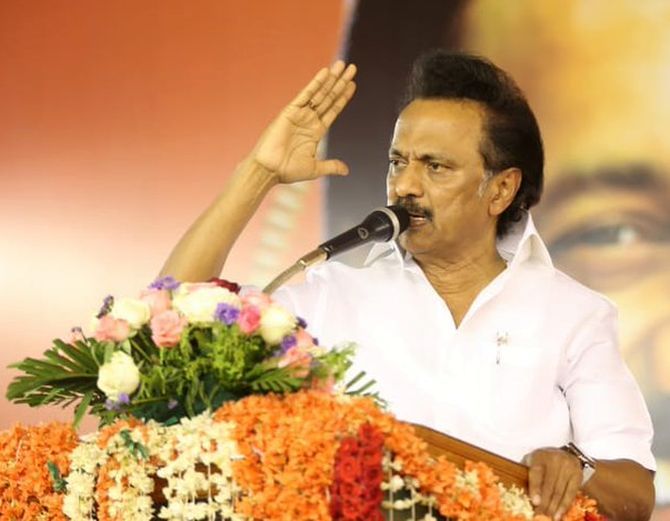If the DMK under Stalin is unable to do well in the Lok Sabha elections, his personal and political standing in the party will be threatened.
But if the party does well, Stalin is the next kingmaker to watch out for, report T E Narasimhan and Aditi Phadnis.

When M Karunanidhi, the patriarch of the Dravida Munnetra Kazhagam, died last year after naming his third son M K Stalin as his heir and successor, there was extensive speculation about the fate of the party, not only because of the challenges to Stalin’s leadership from his brothers and sisters but also his capacity to forge relationships with the DMK’s traditional alliance partners.
The fear was that he would not be taken seriously by anyone.
Those apprehensions have proved to be unfounded so far.
True, the DMK lost the RK Nagar assembly constituency resoundingly to a candidate from the Sasikala faction of the All India Anna Dravida Munnetra Kazhagam.
But that setback is now all but forgotten.
Stalin handled his family with both directness and diplomacy.
In a letter to workers soon after his father’s death, he made it clear that he was in charge now, not brother M K Alagiri.
Chennai saw one of the earliest conclaves of anti-Bharatiya Janata Party blocs in December when, much to the surprise of everyone, including possibly Congress president Rahul Gandhi, Stalin declared Gandhi Tamil Nadu’s choice for prime minister.
It was a masterly move.
Not only did Stalin rule himself out for the top job, but the gesture also served as a way to establish a rapport with the Congress chief and to soften up the party in seat-sharing negotiations that would follow.
It is hardly a secret that the Congress is so weak in the state, it had become a burden for the DMK in the 2016 assembly election.
But the party has a dedicated vote bank and Stalin’s gesture preempted any unreasonable seat-sharing demands by the Congress.
In the days to follow, his instinct proved to be right.
When the seat-sharing arrangement was announced by the two leaders earlier this month, it was with a minimum of fuss on the Congress’s part.
Now, the Congress will contest 10 seats (nine in Tamil Nadu and one in Puducherry) of the 40 (39 in Tamil Nadu and one in Puducherry).
The party had earlier indicated that it would have wanted 16, but nothing more was heard from it.
This is Stalin’s first Lok Sabha election as party supremo and the DMK will naturally put everything it has into it.
Stalin now has undisputed control over his party, with the added advantage that because he has micromanaged so many successive elections, he knows the organisation inside out.
When the DMK returned to power in 2006, it was seen largely as the effort put in by him, for which he was rewarded with the post of minister for municipal administration and rural development -- considered to be one of the most powerful portfolios.
An officer who has worked with him says he used his position to grow the party because he said at the time: “Whatever development work you do in the rural areas will be converted into votes.”
Stalin is a details man.
If he is organising a conference, he will visit the conference hall two days prior to the conference date, will demand to be walked through every step and will point out mistakes.
He is not one to tolerate open-ended speech-making.
He has deep and wide control of the party and what he lacks in oratory (when compared to Karunanidhi), he makes up by his organisational knowledge.
He has both won and lost elections, so he knows what to do but also the pitfalls he has to avoid.
In 1984, he fought his first election from the Thousand Lights assembly constituency in Chennai.
He lost by a narrow margin.
A long hiatus in the political wilderness followed.
He learnt from that period.
Of the eight assembly elections he contested, he has lost only twice. And he has experience of Lok Sabha polls too, the last being the May 2004 elections, when cousin Dayanidhi Maran was selected the DMK candidate for the Lok Sabha seat from Chennai.
Stalin managed his poll campaign.
This time, he has a lot going for him.
The AIADMK is split into two official, three unofficial factions.
There are mixed feelings about the BJP and welfarist moves by the central government tom-tommed as Narendra Modi’s unique initiatives are a drop in the ocean for a state where welfarism has been the ruling credo for more than 30 years.
If even after all this, the DMK under Stalin is unable to do well in the Lok Sabha elections, his personal and political standing in the party will be threatened.
But if the party does well, Stalin is the next kingmaker to watch out for.











